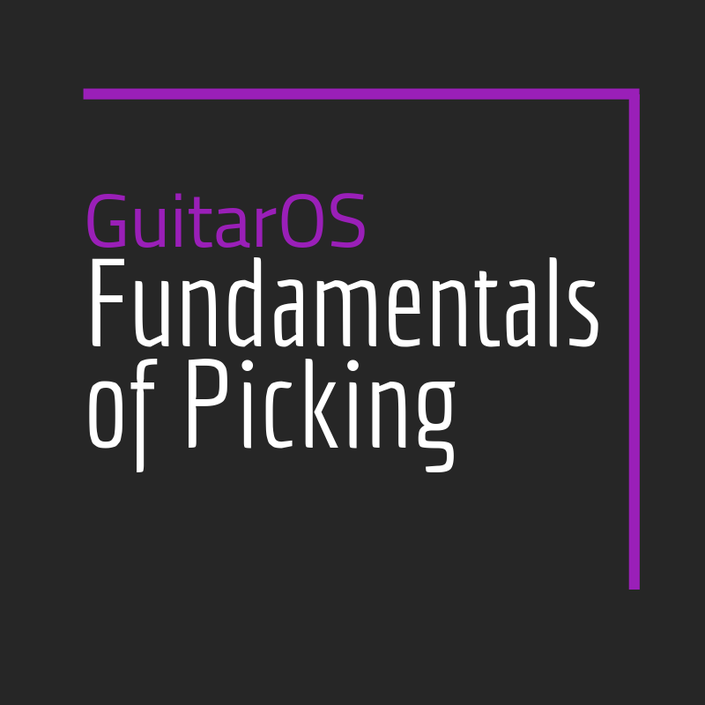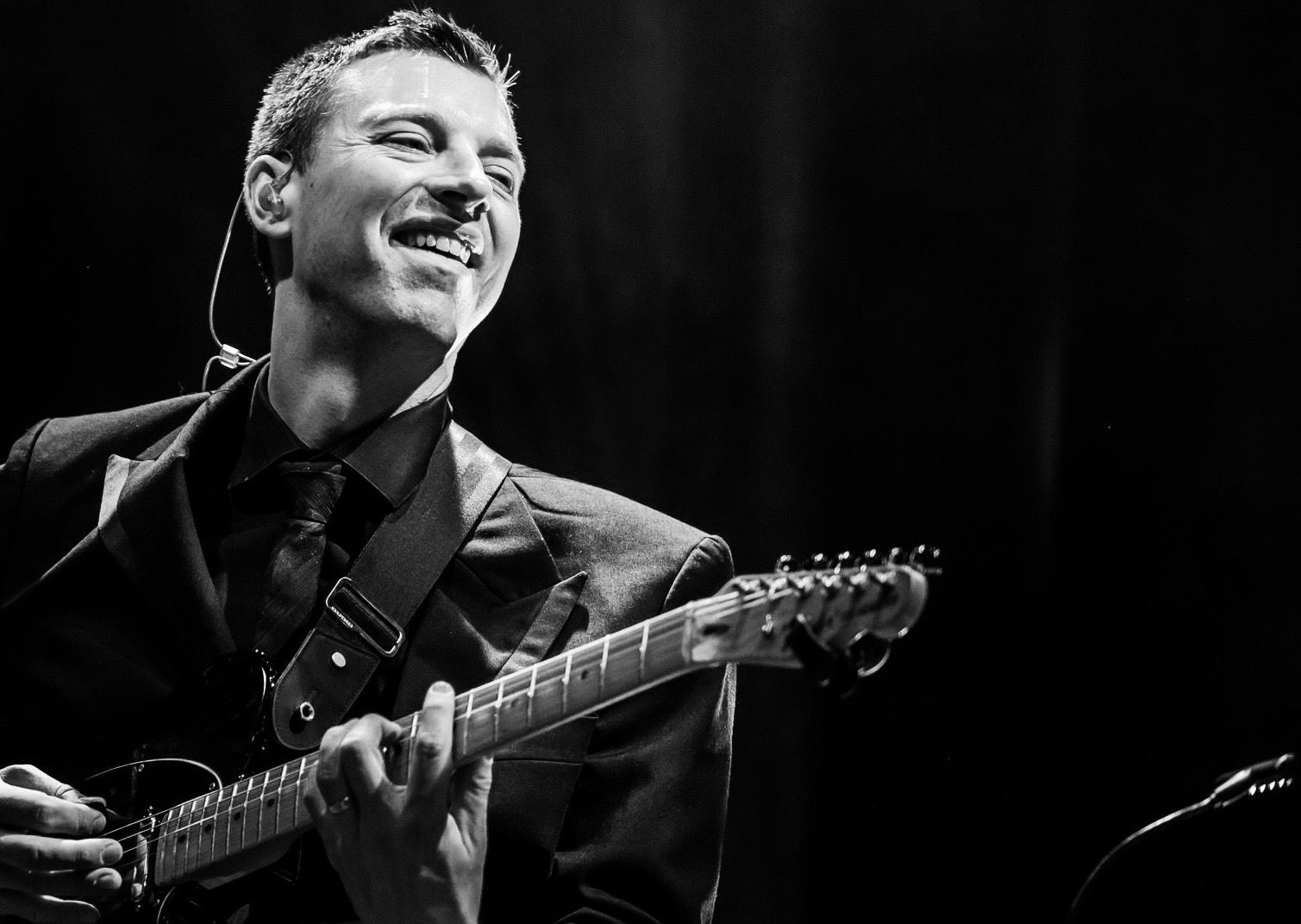
Fundamentals Of Picking
The step-by-step guide to developing picking technique that works for you.
If you ask some badass guitar players how they do their thing, you’ll get a whole lot of unhelpful answers:
- “you gotta practice a lot”
- “keep messing with it, you’ll get it”
- “you have to make really tiny motions”
- “hold the guitar like this, and the pick like that”
- “I do it this way, and this is the only way”
and perhaps the most damaging half-truth of them all:
- “there’s no one way to do it, so don’t worry about technique.”
This is called survivorship bias: we’re trying to learn from those who came before us, but we only know about the people who have “succeeded” at guitar enough for us to be aware of them.

What these badass pickers won’t tell you (if they remember it at all) is how they once spent a whole summer locked in their rooms, experimenting.
Or that an effective, intuitive approach to technique was something that clicked early on for them.
Or sometimes they’ll tell you they do one thing, but a closer examination reveals that that’s not what they’re doing at all.
These badasses won’t tell you that—although everyone’s physiology and musical tastes are a little different—there are only so many “good” ways to do it.
Most of them just plain don’t know the truth:
There is a mix of picking technique that is right for your hands and musical ambitions.
If you systematically learn the main picking styles, you can figure out the right blend for you.
The good news is that there aren’t a hundred of these picking styles you have to learn. There’s not even ten.
By my count, there are four big ways of using a pick, and two additional ways of incorporating your other picking hand fingers.

If you learn these six different ways to approach picking, you’ll be able to comfortably “solve” all but the most intractable picking “problems.”
You’ll find a blend of these techniques that works for your unique physiology and musical tastes.
Fundamentals of Picking walks you step-by-step through a series of exercises that will dial in each of these techniques.
Spend the time in the woodshed, and you’ll soon find yourself arriving at the right picking solution without having to consciously think about it.
Say goodbye to blindly groping your way forward, trying to suss out why your technique isn’t working for you.
Say goodbye to vague, unhelpful instruction.
Say goodbye to well intentioned advice from someone who has never struggled with the same problem you have.
Say goodbye to untested methods by teachers who haven’t played anywhere more impressive than their mom’s basement.
Say hello to a systematic, actionable method, written by...
...oh yeah:
Who the hell am I?
Why should you believe anything I have to say?
This is me.

My name is Josh. I’ve been a self-taught guitarist for twenty-plus years. It’s been my only job for over a decade.
For most of the 23 years I played guitar, I sucked.
Like you, I’ve seen more than my fair share of “I-was-once-just-like-you-but-then-I-discovered-this-long-lost-secret-and-now-my-life-is-amazing!” sales pitches.
Don’t worry: I’m not trying to go all sleazy internet scam artist on you and tell you that I learned some magical “secrets” that made me amazing at guitar.
The truth is more subtle and nuanced than that:
In any field of expertise, there are some things that are best understood & explained by someone who was emphatically not a natural.
After all, how can someone who could always “just play” explain to you what’s really going on under the hood?
Academics call it “the curse of knowledge”—the inability of experts to remember what it was like when they were still newbies.

We talked before about survivorship bias, which lets us see only those players who—through some combination of good luck, hard work, and excellent taste—have “survived” long enough for us to be aware of them.
I’m a guy who has experienced both good luck & hard work.
I lucked my way into a scene of world-class musical badasses—people who’ve played & toured with iconic artists like Stevie Wonder, Sting, Jay Z, Elvis Costello, Pat Metheny, John Mayer, Night Ranger, and a crap-ton of others.
Then I worked my ass off trying to deserve that amazing good fortune.
Along the way I learned how to practice. I got my time & feel together. I learned to think & speak using the language of working professional musicians.
And I figured out how to get my hands to reliably do what I want.
For each of those huge wins, I’ve created a course to share what I’ve learned, so people like you can go straight to the good stuff, without all the pointless flailing about, false starts, and dead-ends.
In fact, let’s hear from some of those people just like you.

"I hate you. But in a it’s-really-nice-to-feel-like-I’m-building-a-good-foundation-but-damn-is-this-hard-work sort of way."
-Ben K, Chicago

"Awesome. It has genuinely helped my playing."
-Todd L, Los Angeles
These are people just like you. Once you've taken the course, I hope you'll write me a note like this so I can include it here.
Want to know what my fellow teachers have to say about it?

"This is genius. Thank you."
—Lara Mirinjian, author of The Sight Reading Solution & consistently voted one of the top music teachers in Los Angeles

"Focused, thorough instruction that supplies the missing ingredients we guitarists need in order to excel."
-Larry Newcomb, renowned guitar instructor & PhD in music

"Josh cuts through the all noise surrounding technique and gives you clear, step-by-step instructions on how to develop picking chops that work for you. Recommended."
-Eric Justen, owner & lead instructor at Guitar Smart Studios, guitarist for Tripping Billies, badass sideman
So how 'bout it?
Are you ready to find the picking technique that works for your unique hands & tastes?
Frequently Asked Questions
Your Instructor

A lucky break forced me to make the jump from "fairly decent bar band guitarist" to "professional musician" long before I was ready or qualified.
Suddenly I was surrounded by elite professional musicians, people who'd toured with huge acts and had long lists of recording credits.
It was a baptism by fire as I scrambled to quickly develop the skills & knowledge necessary to operate in this new space.
Along the way, I discovered something surprising—internet gurus and big-name music schools alike are focused on all the wrong shit.
Badass musicians the world over share a common language & a set of priorities I've never seen taught anywhere else.
It took me awhile to piece it all together & put it all in the right order.
But now that there's a clearly defined path, all that's left is for you to decide you're done with wandering blindly in the darkness, done depending on luck, ready to show up and put one foot in front of the other on the road to badassery.
I hope you'll join us.
Course Curriculum
-
StartDPS Principles
-
StartDPS Application One: 2NPS Ascending
-
StartDPS Two: 2NPS Descending
-
StartDPS Application Three: Variants of 1 & 2
-
StartDPS Application Four: String Skipping
-
StartDPS Application Five: Directional Picking
-
StartDPS Application Six: Forcing Upstrokes
-
StartDPS Application Seven: Little Sweeps
-
StartDPS Application Eight: 3NPS
To me, this seems like a no-brainer.
Fifty bucks could buy you two guitar shop lessons…
…or 42 lessons, with 244 short examples, covering 6 distinct techniques (plus an additional section on badass deliberate practice).
Fifty bucks could buy you two books on the topic…
…or you can get the insight from every one of the books, courses, and lessons I studied in developing this program. (I personally spent <$500 and two years learning this.)